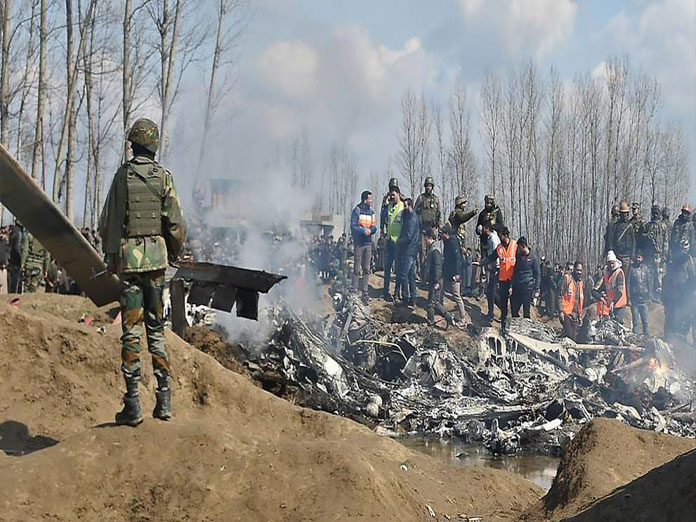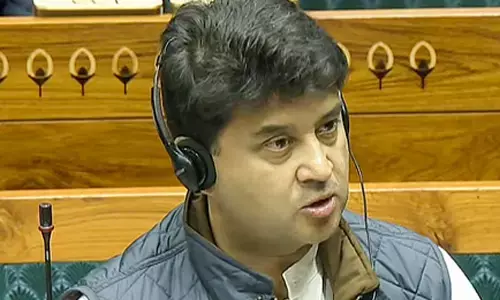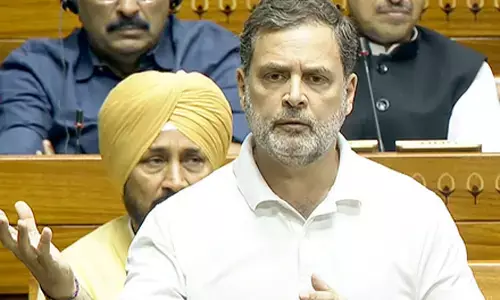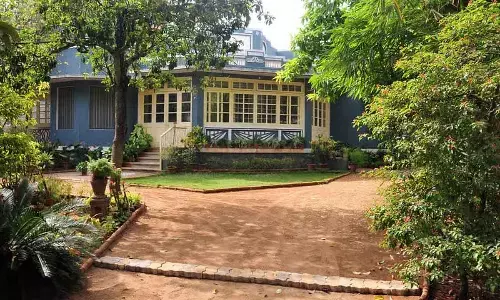World powers call for calm as India and Pakistan trade fire in Kashmir

Indian and Pakistani troops traded fire briefly along the contested border in Kashmir on Thursday morning, a day after the two nuclear powers both downed enemy jets, with Pakistan capturing an Indian pilot
NEW DELHI: Indian and Pakistani troops traded fire briefly along the contested border in Kashmir on Thursday morning, a day after the two nuclear powers both downed enemy jets, with Pakistan capturing an Indian pilot.
The United States, China and other world powers have urged restraint from the two nations as tensions escalate following tit-for-tat airstrikes in the wake of a suicide car bombing that killed at least 40 Indian paramilitary police in Indian-controlled Kashmir on Feb. 14.
Pakistan Prime Minister Imran Khan has called for talks.
“History tells us that wars are full of miscalculation. My question is that, given the weapons we have, can we afford miscalculation,” Khan said during a brief televised broadcast to the nation. “We should sit down and talk.”
Pakistan and India have fought three wars since independence from British colonial rule in 1947, two over Kashmir, and went to the brink of a fourth in 2002 after a Pakistani militant attack on India’s parliament.
Pakistan has shut its airspace, forcing commercial airlines to reroute. Thai Airways International announced on Thursday that it had cancelled flights to Pakistan and Europe, which left thousands of passengers stranded in Bangkok.
On Thursday morning troops from India and Pakistan briefly exchanged fire in Poonch, a district in Indian-occupied Kashmir, according to a statement from the Indian army.
“The Indian army retaliated strongly and effectively,” said Lieutenant Colonel Devender Anand, a defence ministry spokesman.
The firing, that India claims were initiated by Pakistan began just after 0600 local times (0030 GMT), lasted a little over an hour and was significantly less elevated than artillery fire between the two sides on Wednesday. There were no reported casualties in the last clash.
India is building more than 14,000 bunkers for families living along its border with Pakistan in Jammu and Kashmir state, hoping to keep them safe near their homes instead of evacuating them due to artillery firing.
An India's Border Security Force (BSF) soldier keeps vigil during a patrol along the fenced border with Pakistan in Ranbir Singh Pura sector near Jammu February 26, 2019. REUTERS/Mukesh Gupta
On Wednesday evening India’s foreign ministry handed a dossier to Pakistan that it claimed detailed camps of the Pakistan-based militant group that carried out the Feb 14 attack.
The conflict comes at a critical time for Indian Prime Minister Narendra Modi, who faces a general election in a matter of months.
Late on Wednesday B.S. Yeddyurappa, the leader of Modi’s Bharatiya Janata Party in the southern state of Karnataka, said India’s strike inside Pakistani territory would help the party to win back power in the state - the first such comment from a member of the ruling party.
“This has brought a pro-Modi wave all through the country,” he told reporters.
“The effect of this will be seen in the elections.”
INTERNATIONAL CONCERN
The latest escalation marks a sudden deterioration in relations between the two countries. As recently as November, Pakistan’s leader Khan spoke of “mending ties” with India.
The White House urged “both sides to take immediate steps to de-escalate the situation.”
U.S. Secretary of State Mike Pompeo said in a statement he had spoken separately with the foreign ministers of India and Pakistan and urged them to “prioritise direct communication and avoid further military activity”.
Pakistan’s envoy to the United States, Asad Majeed Khan, said Islamabad would like to see the Trump administration play a more active role in easing the crisis.
At the same time, he said the lack of U.S. condemnation of India’s strike on Pakistan was “construed and understood as an endorsement of the Indian position, and that is what emboldened them even more”.
China, the European Union and other countries including Iran also called for restraint.
The Chinese government’s top diplomat, State Councillor Wang Yi, spoke by telephone with Pakistan Foreign Minister Shah Mahmood Qureshi and expressed “deep concern”, China’s foreign ministry said in a statement on Thursday.
The United States, Britain and France proposed the United Nations Security Council blacklist the head of Pakistan-based Jaish-e-Mohammad, which claimed responsibility for the Feb. 14 attack. China is likely to oppose the move.
FLIGHTS CANCELLED
Thai Airways said it had cancelled more than a dozen flights to Europe due to Pakistan’s move, along with all flights to and from the country.
Several airlines including Emirates and Qatar Airways, suspended flights to Pakistan on Wednesday, while others such as Singapore Airlines and British Airways were forced to reroute flights.
Singapore Airlines said on Thursday all of its Europe-bound flights would continue as planned, avoiding the affected airspace as necessary.
Flights from the Middle East and India were also affected. Air Canada said on Wednesday it has temporarily suspended service to India.
Migrant workers were fleeing India’s Jammu and Kashmir and tourist arrivals have fallen to a trickle due to the conflict, badly hurting businesses in the Himalayan region known for its scenic beauty and fruit harvests.








